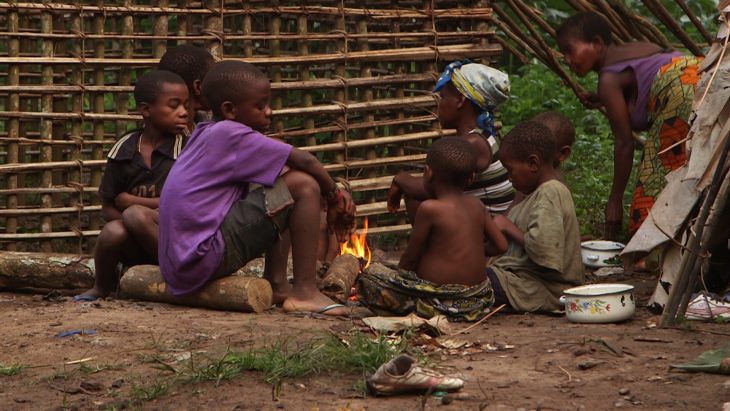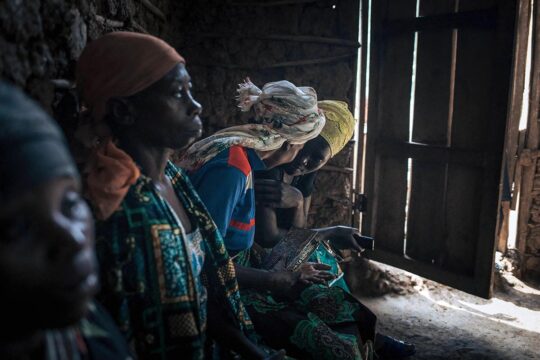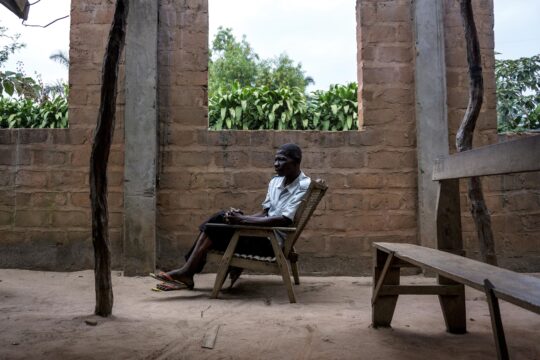It was supposed to be an historic trial for the Democratic Republic of Congo, the first one for alleged crimes of genocide. But the case has got bogged down at the Appeals Court of Lubumbashi (southeast). This court was given the case in line with the Statute of Rome, founding text of the International Criminal Court (ICC), which says crimes of genocide fall under the mandate of appeals courts.
Those accused are 23 Bantus and 10 Pygmies charged with genocide and crimes against humanity in violence between their communities since late 2013 in the province of Tanganyika. They were arrested in several waves, then transferred and detained near Lubumbashi, the country’s second city, which is located hundreds of kilometres south of the violence.
Despite progress in education, health and voter participation, the hunter-gatherer Pygmy people have been discriminated against for generations, and are demanding their rights as equal citizens. Clashes between militia from both sides, allegedly fuelled by certain politicians, left some 650 people dead in 2014 and 2015, according to the UN refugee agency UNHCR.
This violence has also resulted in the burning of villages and has led tens of thousands of Bantus and Pygmies to flee their homes. There is now relative calm, whilst reconciliation efforts are under way. But most of the displaced are still too afraid to go home. A few have gone back and are receiving humanitarian aid to help them start again from scratch.
The Lubumbashi trial started in August. Shortly afterwards one of the 11 Pygmy suspects came to a hearing too thin and weak to stand, then was hospitalized and died. The case was constantly postponed, with judges absent and witnesses failing to turn up. The latest example is a hearing scheduled for January 11, now postponed until February 22.
“The trial needs to go fast so we know who is innocent or guilty. We can’t just keep people in prison like that,” André Tubomeshi, one of the lawyers for the Pygmies, told JusticeInfo. He says their prison conditions “leave something to be desired”, like other prisons in the country. He also expressed concern that all the detainees have “become thinner”.
In a December 16 communiqué, the Kinshasa-based African Human Rights Association (ASADHO) and Lubumbashi-based ASBL Justicia said witnesses had not come because of the Registrar’s “logistical difficulties” in notifying them. They said lawyers for the victims were also having trouble speaking to their clients who “for the most part” are not participating in the trial.
“The Congolese government is not providing resources,” Jeff Mbiya, coordinator of the Humanitarian Communicators Network in Lubumbashi, told JusticeInfo. Listing other “weaknesses”, he said members of the court were “always moving around” because they have other obligations, and show a “lack of interest” because there is a lack of resources to investigate and the alleged crimes were committed a long way away.
As a result, the first genocide case in the country may well -- as André Tubomeshi, Jeff Mbiya, ASADHO and ASBL Justicia fear -- end up botched because the “lack of financial and logistical means” prevents the judicial authorities from carrying out “in-depth investigations” and conducting procedures “according to the standards (…) of the International Criminal Court”.
The two associations are urging Kinshasa to provide more support for trials of serious crimes and to create a public reparations fund for victims. More specifically, they are calling on the UN mission in the DRC (MONUSCO) to support the genocide trial in Lubumbashi. The UN Joint Human Rights Office (UNJHRO), which is attached to MONUSCO, says it is already doing this.
“We are funding a mission to ensure protection of victims, and we are supporting the Registrar so he can notify the victims and witnesses,” UNJHRO head Jose Maria Aranaz told JusticeInfo. He also said MONUSCO was providing support to pro bono lawyers and training them as well as the judges on dealing with international crimes.
Witnesses should be before the court on February 22 if they are informed in time. “Nevertheless, there are still serious concerns such as the lack of support (from the State) for defence lawyers,” says Jose Maria Aranaz. “We are trying to tackle certain procedural problems to ensure that fair trial guarantees are respected as much as possible.”
Pygmy rights activist Rogatien Kitenge told JusticeInfo that to have a “dissuasive effect” the trial should have been held in the region where the crimes were committed. But he thinks the most important thing is that the authorities be held to account. He says the conflict escalated because they neglected to do anything about it, pretending they were in control.
The administrators of Manono and Kabalo are expected to appear, according to several sources, but ASADHO and ASBL Justicia say many others have slipped through the net. They say many heads of ethnic militia groups and other people implicated in these serious crimes “have never been arrested and are circulating freely in Kalemie, Nyunzu, Kabalo and Manono”.





